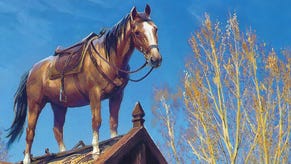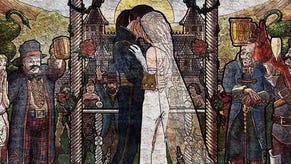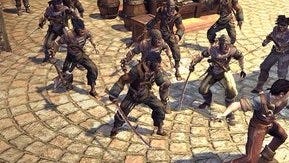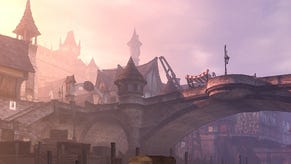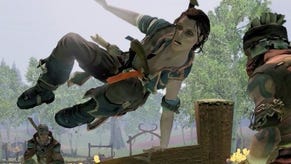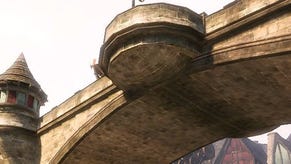Fable II
Heroic.
The swashbuckling animation and on-the-fly environmental details, along with your gradually expanding arsenal of moves, elevate Fable II's combat so much that it's the game's strongest point. Impacts are meaty, and enemies are varied in both strategy and appearance: massive trolls burst from the earth and bandits drop down from the trees, while hollow, skeletal men lumber towards you en masse before shattering under gunfire in a dry explosion of bones. The arrangements of enemies call for different strategies, and getting the most out of a fight still requires more traditional videogame attributes like skill and dexterity (in other words, I struggled).
Combat's not the only strong point, however: Lionhead's story is pleasantly mysterious, and its characters, quests and settings are all infused with an unmistakably British humour - more Adam and Joe than Monty Python, pleasingly. The sheer scope of the game is an achievement in itself, gliding from a knockabout Dickensian childhood through a grim middle age, and on to a conclusion which all hangs on some particularly tricky choices. Along the way, the narrative manages to cram in pirates, ghosts, and a familiar Fable variation on werewolves, a sure sign that the developers have your best interests at heart.
And Lionhead has largely delivered on its promises along the way: your dog, although essentially a mechanic for tempting you to explore, is a masterpiece - lovable, convincing, and almost entirely self-sufficient. Equally, the previous game's morality system has undergone a subtle rebalancing: it's still a largely binary affair, but your choice of oppositions tend to be more surprising this time around. As often as the game makes you choose between standard good and bad deeds, it makes you think about subtler deviations - how much incidental brutishness you allow yourself in the name of a justifiable cause, for example, or how much embarrassment you'll opt to create for no real reason. And Fable II also understands what few other similarly inclined videogames have: morality has no kick unless the game can actually make you want something quite desperately. In the course of Fable II, you'll be offered some genuine delights, alongside the promise of a few brutal sacrifices, and they're all choices that carry a convincing price for your world.
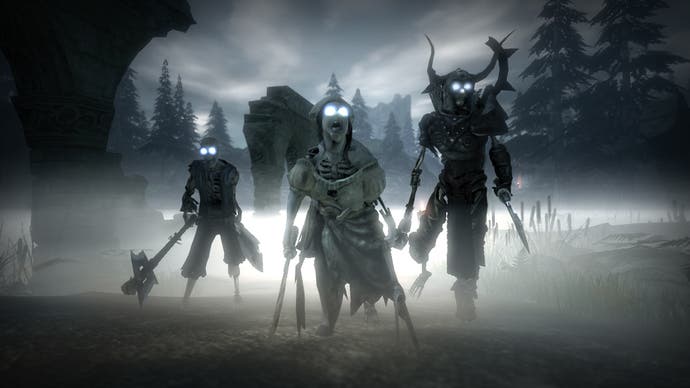
There are problems, of course, but they tend to be minor annoyances. Context-sensitive prompts can be a little too sensitive to context, requiring a spot of shuffling back and forth to activate, and dialogue often takes a millisecond too long to load, resulting in a few stilted and unnatural conversations. There's a fair amount of backtracking, too, although fast travel is easily available, and an empty stretch of road is often a chance to enjoy another brief dust-up anyway. And despite the ambition of the game, I encountered precisely two bugs along the way: at one point I found myself trapped in a room I'd just looted when a hat-stand fell across the doorway and I had to fast-travel out, and on another occasion, a prostitute I was talking to got herself wedged in the wall of a townhouse, only to emerge out of the front door a few moments later looking faintly confused by the whole experience.
But these are quibbles compared to the grand scope. It took me two solid days of playing to scramble to the end of the narrative, and during that time, and due to a handful of particularly nasty choices - I had murdered innocents, I had laughed at a few funerals, I had Kicked a Chicken a Good Distance - I had somehow transformed from a nubile cutie in gypsy rags into Oliver Hardy's zombified older sister, bloated and saggy, my rotting skin covered in scars from inept battling, and the remains of my hairdo splattered unappealingly over my sweaty forehead. I had become distinctly unlovable, and yet the game was still willing to show me a good time.
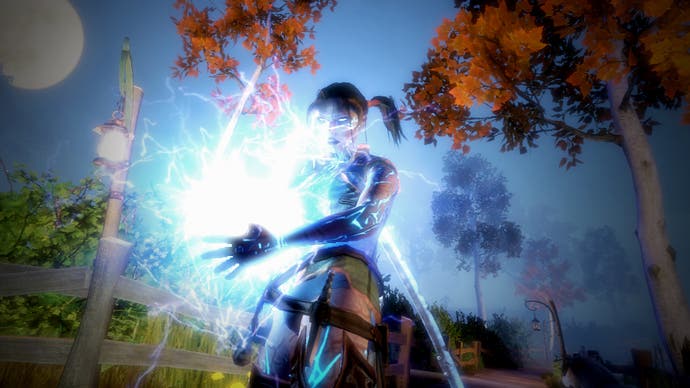
Fable II's generous and forgiving template isn't one that many games choose to follow, but it proves convincingly that if you're clever enough, you can create a consistent challenge without resorting to mindless punishment, and you can craft a sharply told story that still has room for the player to express themselves within. Inclusive and often thought-provoking, this is a daring portrait of a game-world with all the failure cut out, and it's hard not to love a game that loves you so much in return. Fable II will charm you, thrill you, and leave you very, very happy.



